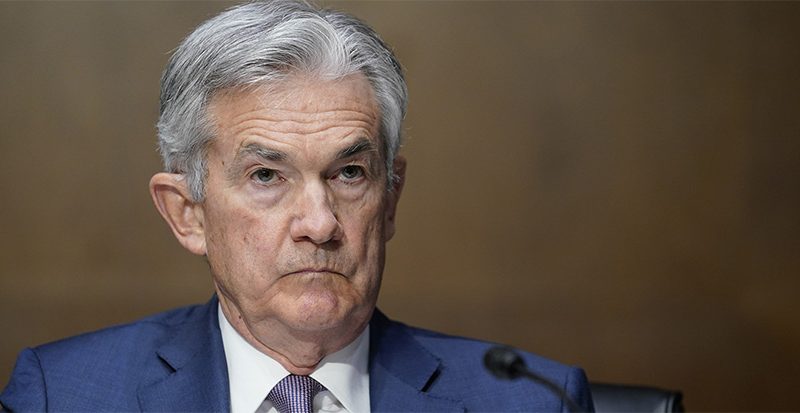by John Mauldin, Mauldin Economics
- Improving World
- Out the Risk Curve
- The Opportunity Marke
- It’s All SIC, All the Time
We’re midway through the SIC 2021, and as I expected, it’s shaping up to be the biggest and best Strategic Investment Conference I’ve ever hosted. So far, all of our presenters and panelists have given stellar performances... and attendees seem to agree with that assessment.
Even if you haven’t been there for the live “New Cold War with China” panel, venture capitalist (and Midas List) Joe Lonsdale’s presentation, or the memorable Habib/Zelman real estate analysis, the only way you can truly miss out is by not buying an SIC 2021 Pass.
Candidly, the China panel was worth the price of admission for your humble analyst. I was aware that the People’s Bank of China was exploring issuing its own cryptocurrency, but I had no idea of the consequences of that move. They start out with a billion users, then add the Belt and Road countries, offer the ease of a no-transaction-fee, frictionless digital currency (which can convert to their local currency at the touch of a button) and they are well on their way to becoming a global currency. I don’t usually watch a video twice, but this is one I will watch at least once more, and read the transcript three or four times. It will take me weeks to unpack the implications. What I heard from Emily de La Bruyère was simply a revelation. Packaged with Louis Gave, George Friedman and Mark Yusko it completely transformed my view of global currencies and US-China competition.
The entire conference will be available on video, audio, and transcript for you to enjoy at your leisure. And if you hurry and get your Pass now, you can still catch some great panels and presentations live, including:
- Macro geniuses Felix Zulauf and Grant Williams chatting first thing Monday morning
- Ian Bremmer taking us around his geopolitical world
- Our “Investing Masterclass” with Byron Wien, Jerry Jordan, and Doug Kass on Wednesday
- ARK Invest CEO Cathie Wood’s speech about disruptive technologies on Wednesday
- Howard Marks and yours truly on Friday
- Our Final Panel on Friday
…and so much more. We’ll also have an extra day on May 18 devoted exclusively to actionable investment recommendations.
My friend David Bahnsen (see below) wrote this in his letter today:
Day one of the Mauldin Strategic Investment Conference is complete and I think I learned more from a few of the presentations I [virtually] attended than I have learned on some of these topics in a year. Absolutely invigorating stuff on China, trade, US housing trends, and so much more… I can only say that the other speakers and presentations are among the best I’ve ever come across in these types of events, and I will likely do a Dividend Cafe wrap-up when the event concludes at the end of next week.
You owe it to yourself to get your SIC 2021 Pass today. You can still claim your 50% discount until May 31.
Improving World
Below is the second part of my podcast conversation with David Bahnsen. You can read the first half in my last letter, or listen to the entire podcast. [Note that items in brackets are inserted today.]
David Bahnsen: Well, hello and welcome to another edition of the Capital Record. This is part two of a two-part series, picking up where I left off last week with my good friend John Mauldin. We decided last week to bite off the last 20 years of national debt and economic stagnation and then talk about the next 20 years of national debt and monetary policy. And it turns out 40 minutes was not quite enough to get it all. So John graciously agreed from his beautiful home in Puerto Rico to join me once again. John, thanks for joining us once again at Capital Record.
John Mauldin: David, some of my best memories in recent years are just simply time with you. You always force my mind to work a little bit better. I wish I had you on my shoulder when I was writing my letter.
David Bahnsen: Well, I certainly appreciate hearing that, especially from you, John. And, you know, even before it became more personal in these discussions and correspondence and conversations and dinners and lunches, and things took on a life of their own for many years, I felt like I had you on my shoulder while reading Thoughts from the Frontline so religiously every week, and of course your books like Bull's Eye Investing. That is always going to be a very underrated book, and I think it was actually rated very highly.
John Mauldin: It hit number one in China [investing books], of all places. And the editor of the Hong Kong Economic Review and someone in Beijing decided it was the best book of all time and they just promoted the heck out of it. I had a column in the Hong Kong newspaper for like 10 years translated into Chinese. And when I went over to Hong Kong, I was the front-page picture and had a thousand people in the room. Those were heady times for this country boy.
David Bahnsen: Well, as it should be. And when I say underrated, I mean, I would say Michael Jordan was an underrated basketball player and he's the greatest of all time and everyone knows it. Yet he was that good. The Bull's Eye Investing was that good in this sense, at the time it was written and the introduction of the concept of Muddle-Through Investing. There are people that have, I believe, a sociological and a psychological affinity towards pessimism and doom and gloom. And there are certainly people that are really almost addicted to a Pollyanna-ish, everything's-always-bullish type of dynamic as well. And for me, as someone who could identify early on the psychological hang-ups that were keeping people from being more objective, your book was so refreshing in that I didn't have it in me to be a permabear. All I had to do is look out my window. And yet I certainly knew coming out of the tech crash, 9/11, the unsettling parts of our new millennium, this wasn't a time for permanent bullishness either. And I'm sure over the years you were proud of things you got right and other [way too many for my comfort] things you now recognize maybe you got wrong. But the point is coming at it from a posture that is realistic, not committed to permanent pessimism or permanent optimism.
John Mauldin: I've developed this kind of duality. It's hard to think of the next 20 years or indeed the last 20 years without being very optimistic about the future of humanity. In terms of our ecosystems, the amount of forest, amount of water we're using, the amount of power and so on, with the exception of oceans, we are so much better off than we were 10 or 20 or even 40 years ago. We're not doing a very good job with the oceans but fewer people are in poverty. The world is improving. Technology is moving absurdly fast. I think this will be the decade of biotechnology. Look at what we've done with the COVID response, the speed of the vaccine development. We're going to see so much science, so much knowledge come out of this that we have no idea where it's going to take us. We can create all sorts of incredible new approaches to health and aging. This decade is going to be powerful. So it's hard not to be optimistic.
David Bahnsen: Is your optimism limited to technology and biomedicine, health sciences? That's been a focus of yours for a long time. But where else do you derive it?
John Mauldin: I look at artificial intelligence. I don't think we realize the extent to which 3D printing and virtual reality is going to be a focus. There's a technology coming along that's literally absolutely going to turn the agricultural world on its head. It’s going to be great for humanity. We'll be using less fertilizer and less fungicide and less herbicide and getting healthier, better plants. So my pessimism, if you will, goes back to what we were discussing last week. We as a society are not managing our debt, are we're not managing our social systems very well. I get very concerned. My letter this last week [two weeks ago] was about what happened in 1971. The Great Society was beginning to kick in and we were looking at all Nixon’s social programs. We think of him as this arch-right conservative but he had a lot of very liberal policies.
David Bahnsen: I just want to be on the record that I did not think of Nixon as ultra-right conservative.
John Mauldin: Well then, we agree.
David Bahnsen: Price controls, wage controls, and significant weakening of the US dollar. Other than that, how was the play, Mrs. Lincoln?
Out the Risk Curve
John Mauldin: For 70 years, we've only seen 3.9% unemployment rate twice in our history, one was 2019, the other was during the middle of the Vietnam War when we took half a million young men and put them into the Army and those men don't count as employed. They're in military service. So we took half a million people out of the labor force, stuck them into the Army or Navy or whatever. Those two brief instances, and now you've got the Federal Reserve saying they want to get back to [that employment nirvana].
I mean, I'm not so old and neither are you, David. We used to think of 4–5% unemployment as pretty much full employment. Now we have a Fed saying 3.9% is our goal.
And that's going to so distort the financial world.
David Bahnsen: There's nothing new under the sun, right? I mean, there hasn't been. I wrote a piece recently arguing that, by definition, if we're actually getting our vocabulary right, all bubbles are debt-fueled because if you look at the consequences of equity-fueled bubbles, they don't feel like bubbles when they blow up. They're bad, but it's not systemic. The pain and aftermath is limited to those who took direct risk. It is debt-fueled bubbles that actually feel like bubbles and look like bubbles and act like the bursting of bubbles when it happens. A hedge fund recently blowing up [from leverage], and we can go back three or four hundred years, I'm not sure we'd find anything that blew up that wasn't out of leverage. But now the great leverage-taker in our society [is the government and the central bank]. I mean, you get a hedge fund here, there, but I don't know about you, John, I don't mean to be crass, I don't care about these hedge funds... Let them blow themselves up. It's their damn money. It's their investors. These are all grown-ups. But the government is now the big levered actor.
Let's talk investment stuff for a little bit. I'm an investment guy, you're an investment guy. And I spent so much time on this podcast because I also love macroeconomics. But let's talk investing. You bring up an interesting dynamic. Let's not use a 75-year-old, but let's use a 62-year-old that's getting ready to go into retirement. I would make the argument that the reason people right now largely need equity exposure that are into a withdrawal phase of their financial lives is not for the growth. It's not for the total return. It's for the income. A good dividend portfolio can give them a 5% coupon and a bond portfolio is going to give them a 1% to 2% coupon. This is a total turning on the head of that idea [of fixed income]—bonds for income, stocks for growth. Right now, there is no yield available in safe bonds. You talk about going out the risk curve. Well, you can get some 4% and 5% yields in the bond market and...
John Mauldin: But dear gods. What risk are you taking?
David Bahnsen: B-minus credits. They call them junk bonds. You're going to go to levered loans. You're going to go to commercial mortgage-backed securities. Is that risk any less than equity markets?
John Mauldin: No, no. And I think we're setting ourselves up. It's happened three times in my career. You see this huge push down in yields on high-yield bonds, junk bonds, and they're going to blow up someday. I mean that we don't know when. They are encouraging leverage by making rates so low and they're screwing retirees just as the biggest piggy-in-the-python, the Boomer generation, comes along and needs low-risk income. [It is financial repression and it is one of the massive evils that central banks have committed.]
David Bahnsen: [Is the market going to] blow up because of defaults or is it going to blow up because the spreads are re-widening?
John Mauldin: The spreads’ re-widening is the big problem, not a few defaults here and there. You have a trigger point, a few defaults, that makes everyone nervous. The last trigger point we saw was the financial crisis, the Great Recession. Before that it was the tech bubble bursting and a lot of margin debt everywhere. When there's a lot of leverage, you don't sell what you want to sell. You sell what you can sell. If you start saying, let's sell our debt, well, the spreads just blow out. And that creates a phenomenal opportunity.
The last time you started seeing high-yield paying 18%, 19%, 20%... Then you can start taking some risk because it's blown out and all the stuff that's really going to blow up has already blown up in the portfolios. We've seen this three times before and I think it's going to happen again. But the sad part of it is the investors in those high-yield bonds today are going to blow up. They're going to panic and get out, so they're going to lose a lot of money. They'll swear off high-yield bonds forever. It's this financial repression from 12 people sitting around a table setting the most important price in the world, which is interest rates on the US dollar. [And often it’s just one person.]
The Opportunity Market
David Bahnsen: Well, so let's wrap up, John, with this. You've teed up a really neat way to conclude that actually connects to where we started this podcast, with the rejection of both permanent pessimism and permanent optimism. Now you're applying it to portfolio expectations, the way investors ought to think. But from the vantage point of the economy at large, it sounds to me like you are, and I think you even said this exact line before, you are short government and long humanity.
John Mauldin: That is my line, and I’m sticking to it.
David Bahnsen: And I don't know how we could encapsulate the philosophy of this podcast, the philosophy of National Review, of free-market conservatism, of classical liberalism, much better than saying that we are long those aspects of human ingenuity that are investable, exciting, dynamic, that have created progress for thousands of years, and yet short those elements that create bubbles and bursts and debt problems and mismanaged crises and all those things. Yet we have to live with both. We all live in a world of human ingenuity and we live in a world of the not-so-benevolent hand of government touching everything. So, give us a couple of closing thoughts as to how we reconcile those two dynamics.
John Mauldin: At least 150,000 businesses have had to shut down in the last year. That's the bad news. The good news is that there's 150,000 entrepreneurs out there trying to figure out how to get back in the game. I'm optimistic about that. I think as long as we don't screw around too much with the mechanisms of the opportunity market, I don't want to use the word free market, just the opportunity market, the country will be fine. The opportunities will be there.
Are we going to have a potential day of reckoning in terms of our debt and government size? Yes, but it's potential. Can the Federal Reserve monetize more using QE instead of MMT? There's a significant difference in how those work. And as long as it's QE, like Japan and Europe, we might be able to keep the game going, albeit with a great deal of volatility. $40 trillion, $50 trillion in debt with the Fed picking up half of that. Yes, it will slow the economy in general. But I don't have to participate in the general economy, I have my business in front of me and I'm going, OK, this is what I can do within this environment to make money. That's what entrepreneurs do.
David Bahnsen: And so, as we close out, the takeaway is the more things in the free market and opportunity market and the less out of the coercive hands of the state and the distorted hands of the Fed, the better off we're all going to be.
It’s All SIC, All the Time
I have been hosting the Strategic Investment Conference for 18 years. Each year it somehow manages to be a little better than the last, partly because every year we (the ever-growing team) put in more work. I spent at least eight hours prepping just for the Joe Lonsdale interview. Howard Marks? It helps that I’ve been reading him for years. But still a lot of prep. Ian Bremmer? I literally read him every day (his GZERO letter is free) but making sure I have my questions tight and on point still takes several hours. Plus, the introductions and I have the privilege of listening in on the pre-conference calls for each of the guests and panels.
One of my personal fantasy conversations this year will be between my great friends (Drs.) Ben Hunt and John Hussman. I had my questions ready to review in our preconference session, but they actually hijacked me. They planned (such temerity!) their own conversation, basically told me the set-up question, and then the rest of us sat as they went through their conversation. It was the best hijacking I’ve ever been part of. I’m gobsmacked.
We spend months curating the right faculty that meshes, and then months of preparation to make sure you get the very best experience possible. It really does take a small (team) village. As I’ve said before, conferences are my personal artform. I hope you plan to participate.
And with that, I will hit the send button. I know I’m going to have a great week and I hope you do as well. Thank you for giving me your time and attention and making it possible to do the things that I have the privilege of doing. It is a wonderful life! And you really should be following me on Twitter.
Your still trying to wrap my head around Chinese cryptocurrency analyst,

John Mauldin
Copyright © Mauldin Economics













